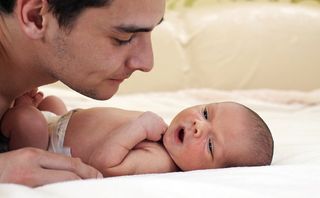Why Do I Get Baby Fever as a Man
Run across One, Want Ane: The Roots of 'Baby Fever'

If the sight of a rack of baby shoes at the shop gets you longing for an infant of your own, residual easy: Y'all probably accept baby fever, and psychologists have but confirmed that you lot're not alone.
Long immortalized in television and movies, "baby fever" is indeed real, a new study confirms. This visceral, emotional desire for a child is more than common in young women than men, the inquiry found, although every bit they age, men are increasingly at risk for what'due south besides known in pop culture as "baby animalism."
"How ofttimes women have the want to have a child goes down with age, and down equally they actually take children," report researcher Gary Brase, a psychologist at Kansas State University, told LiveScience. "For men, it tends to go upwardly. … It's like men and women are converging over time." [Read: Top 12 Doting Dads in History]
The babe decision
Brase researches judgment and conclusion-making, and was inspired to plough his attending to reproductive decisions afterwards he and his wife experienced their own bouts of baby fever. Brase was surprised to find that no 1 had ever researched the phenomenon given how large a life decision it is to take a baby.
"If you talk to a biologist, they say, 'Y'all desire to have children because passing on your genes is the reason why you're here,' but if you talk to an economist, they'd crunch the numbers and say, 'This is a horrible investment idea,'" Brase said. "If you endeavour to do a rational toll-do good analysis, having a child doesn't make sense. But if you expect at information technology biologically, it'southward the merely affair that makes sense. And and then in that location's actual people that somehow effigy it out between those 2." [Read: America's Most Hated Baby Names]
To uncover the role that emotion and desire play in this decision, Brase and his colleagues completed three studies. The first, with 80 undergraduate students, used questionnaires to constitute that people do, in fact, experience baby fever. The students also answered questions about factors that made them more or less probable to want a babe ("lack of money," for case, tends to mitigate baby fever).
To distinguish "babe fever" from a more clear-headed desire to take kids, the researchers asked volunteers if they always experience "a bodily want for the experience, sight and smell of an infant next to you." Women's average rating of how frequently they experience baby fever was 4.22 on a scale of 1 to 9, compared with 2.69 for men.
A follow-up study of 252 more students confirmed that women more often desired a baby than men. The researchers had suspected that socialization might play a role, theorizing that women who more than strongly believed in traditional gender roles might likewise desire one of those roles — maternity — for themselves. That turned out non to be the case, Brase constitute.
"Gender office norms didn't do much every bit far as explaining people'southward want to have a baby," Brase said.
Weighing the pros and cons
Using data from the first two studies to build questionnaires, the researchers and then recruited volunteers via the Internet, gathering an older and more diverse grouping than the earlier student populations. Once more, the results showed that women tend to feel baby fever more than men, while men study more frequent desire for sexual activity, "which is interesting," Brase said, "considering they're related activities."
But comparing volunteers of different ages, the researchers found that women'south baby fever commonly decreases with age and maternity, while men's baby fever increases as time goes by. Fortunately for humankind'due south continued existence, the ii genders converge briefly in their level of baby fever in their 30s. Past their 40s, men study more frequent babe fever than women of the aforementioned age.
Brase isn't notwithstanding sure why this switch takes identify. He did find, unsurprisingly, that pleasant experiences associated with babies, such as seeing a happy infant or adorable baby clothes, increased baby fever, while experiences with muddied diapers and other unpleasant day-to-day realities threw cold h2o on the desire to take a kid. People also consider trade-offs, such equally loss of money or stalled professional goals, Brase said. And the earth is not divided into baby-lovers and babe-haters, the results showed. Many people have strong positive and strong negative associations with babies at the aforementioned fourth dimension.
"People run across a cute baby, and then they say, 'Oh, I want a baby,' but and so they're also thinking well-nigh all the time and money and lost sleep and so on," he said. "Those tin work against each other and withal nevertheless be in the same person."
You lot can follow LiveScience senior writer Stephanie Pappas on Twitter @sipappas. Follow LiveScience for the latest in science news and discoveries on Twitter @livescience and on Facebook .
Source: https://www.livescience.com/15949-baby-fever-reproduction.html

0 Response to "Why Do I Get Baby Fever as a Man"
Post a Comment